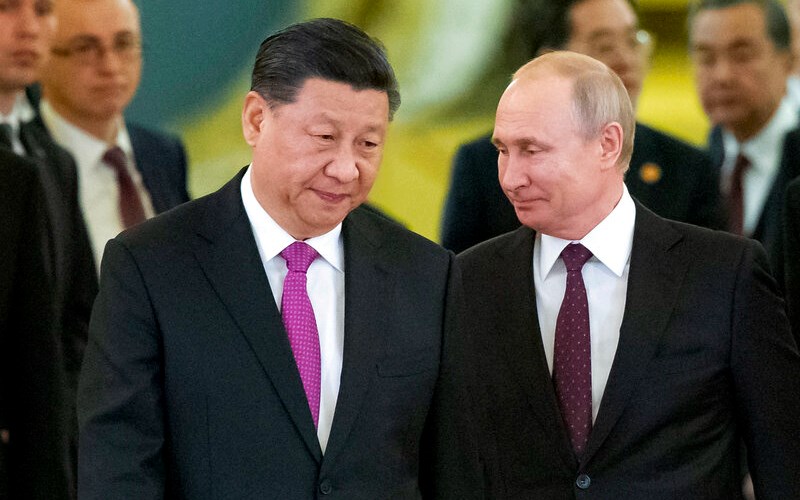Joint training exercises between China and Russia in the Sea of Japan could have worldwide repercussions, catapulting the Chinese navy into a global threat. On Sunday, a Chinese naval fleet joined Russian naval and air forces in the Sea of Japan to begin training exercises. According to China's defense ministry, the objective of the drill code-named "Northern/Interaction-2023" was "safeguarding the security of strategic waterways."
American Family News spoke to Col. Grant Newsham (USMC-Ret.), who during his career served as the first Marine Liaison Officer to the Japan Ground Self-Defense Force. Newsham suspects the exercises' goal "reflects China's intentions to build and operate a global navy that's capable of power and influence projection worldwide."
AI pioneer warns Pentagon new technology will win next warSteve Jordahl, AFN.net Congress and the Pentagon can’t say they weren’t warned that China is passing them in developing artificial intelligence for a future battlefield. At a House Armed Services Committee hearing, AI pioneer Alexandr Wang laid out in plain English what's at stake in the global race for development and control of artificial intelligence. “If we don't win on AI, we risk ceding global influence, technological leadership and democracy to strategic adversaries like China,” Wang, CEO and founder of robotics firm Scale AI, warned lawmakers this week. He testified at the Armed Services subcommittee hearing, “Man and Machine: Artificial Intelligence on the Battlefield.” The country that can most rapidly and effectively integrate this new ground-breaking technology into the next war, he said, will win it. China, he told lawmakers, is investing the “full power” of its massive industrial base to develop AI technology. He went on to describe military investment in autonomous drone swarms, adaptive radar systems, and autonomous vehicles, among other technology-stretching development. “This year they're on track to spend roughly three times the US government on AI,” he said. |
"[They want] a navy just like the U.S. Navy in terms of global capability and political impact," says Newsham, now a senior fellow at the Center for Security Policy. He warns the People's Liberation Army is quickly headed in that direction.
"The Russians," he continues, "have limited global prospects by themselves; but combined with the like-minded dictatorship in Beijing, these two militaries can make their presence felt."

The retired Marine officer points out the Russian and Chinese militaries have been training together in "noteworthy" ways since at least the mid-2000s, beginning with what he describes as "fairly small-scale [and] simple" ground and naval engagements. Over time, those exercises "gradually increased in scale and complexity," he says, to the point where now all three services – ground, sea, and air – take part.
In the past, the joint training exercises have taken place in different locations, ranging from the Western Pacific to the Black Sea in European Russia. Amphibious exercises have also taken place in the Russian Far East and the Black Sea. More recently, however, the Chinese and Russian navies and air forces have conducted joint exercises that "circumnavigate Japan and have also purposely encroached on South Korean territory," according to Newsham.
"This all demonstrates a considerable degree of cooperation between the Russians and the Chinese, and also an intentional and explicit threat to the Japanese and Koreans – and by extension, the United States," he warns.
"[These are] not just token exercises for symbolic purposes," Newsham continues. "Instead, they demonstrate real – and improving – capabilities for the two militaries to operate together."
In addition, the exercises garner the attention and resources of the United States and Japan.
"These exercises tie into a Taiwan scenario," Newsham explains. "If, or when, the Chinese make a move on Taiwan, in whatever fashion, they will expect cooperation from the Russians – at least for a demonstration that requires the Japanese, the Americans, and the South Koreans to divert forces to handle it."
In effect, he warns, "this reduces the American ability to focus resources on Taiwan and limits the already limited support that the Japan Self Defense Force might provide."
According to Newsham, some observers and analysts claim there is nothing to worry about since the Russians and the Chinese "don't like each other." He doesn't entirely disagree.
"There is some fundamental, if not visceral dislike between the Russians and Chinese," he acknowledges, "[but] their strategic interests align [in the form of] hatred of the United States and a desire to bring down, if not destroy, the Americans."
It is that "strategic alignment" that concerns Newsham. "[That's why] we should take these Chinese and Russian exercises – and the objectives behind them – very seriously indeed."
Editor's Note: Col. Grant Newsham (USMC-Ret.) is author of the book "When China Attacks: A Warning to America."







